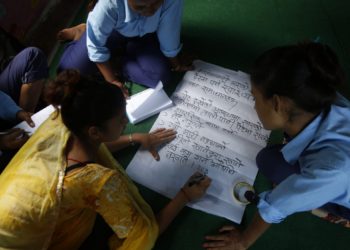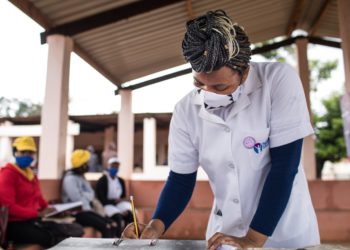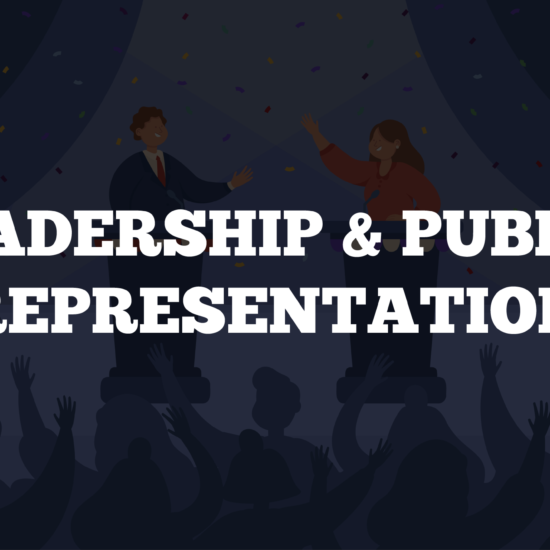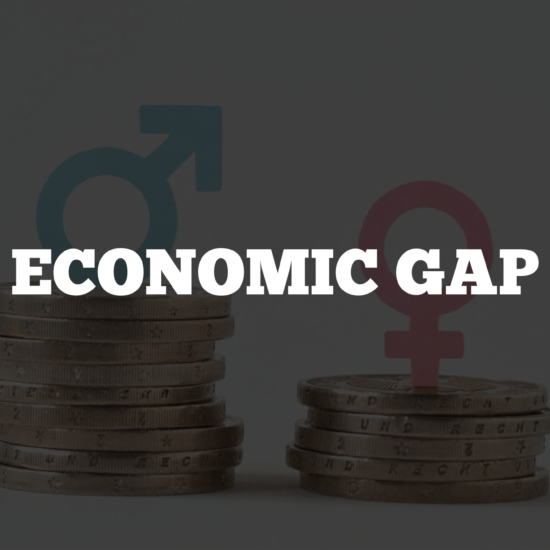TOWARDS GENDER EQUALITY / Gender-based violence and abuse
Gender-Based Violence, Safety & Health
Gender-Based Violence, Safety & Health

FGM support © BBC
Worldwide, 1 in 3 women have experienced physical or sexual violence — mostly by an intimate partner.
The Covid-19 pandemic has both highlighted pre-existing gender gaps in health and exacerbated deep rooted gender-based discrimination and violence.
In September 2021, the World Economic Forum (WEF) noted that for women all over the world their healthcare requirements had been “collateral damage” during the COVID-19 pandemic – with The Lancet medical journal finding a marked increase in stillbirth, maternal death, and maternal depression globally.
UN Women found that women in Bangladesh and Pakistan were less likely to receive information about Covid-19 than men simply because they rarely owned a cell phone.
With access to family planning provision disrupted by COVID-19, the United Nations Population Fund (UNFPA) projects that up to 7 million unintended pregnancies occurred during the pandemic in low- and middle-income countries.
Period poverty has also increased substantially during the Covid-19 pandemic, with 47% of girls and women in 160 countries having experienced more difficulties in getting period products during the pandemic.
The abduction, rape and murder of British woman Sarah Everard by a serving Metropolitan police officer in London in March 2021 shocked the country and led hundreds of women to defy pandemic lockdown instructions and protest for greater protection on the streets of the capital and beyond. The Twitter tag #SheWasOnlyWalkingHome held by many of the protestors highlighted the scale of the anger, fear, and sexual harassment many women experience going about their daily lives.
Since a first two-word hashtag #MeToo went viral, in less than 24 hours in October 2017, the organisation has grown into a self-described global ‘revolution’ to end sexual violence. Their latest report focuses on the impact of the COVID-19 pandemic on sexual abuse survivors of colour. Key findings include that “Women survivors who reported likelihood of returning to an abusive partner [during COVID-19] had fewer than half the financial resources on average than women who reported no likelihood of returning to an abusive partner.”
Gender-based violence is not only devastating for survivors and their families, but also entails significant social and economic costs, according to the World Bank. In some countries, violence against women is estimated to cost countries up to 3.7% of their GDP – more than double what most governments spend on education.
Check out the following links for more data on Gender-based violence, safety and health (related or unrelated to Covid-19):
- The Shadow Pandemic: violence against women during Covid-19, UN Women
- Gender Equality, women’s rights in review 25 years after Beijing, UN Women
- Goal 5: Achieve gender equality and empower all women and girls, UN
- What is gender-based violence, The European Commission
- Facts and figures: Ending violence against women, UN Women
- Global Study on homicide – gender-related killing of women and girls, 2019, UNODC (United Nations Office on Drugs and Crime)
- Global Report on trafficking in persons, 2020,UNODC (United Nations Office on Drugs and Crime)
- UNFPA-UNICEF Global Programme to end child marriage – Act Now: Accelerating gender equality by eliminating child marriage in a pandemic, 2020.
- A New Era for Girls – taking stock of 25 years of progress, 2020, UNICEF
- Women, Business and the Law, 2021, The World Bank
- The impact of Covid-19 on women: time to put gender lenses on?, a Towards Equality webinar by Sparknews, 2020
- My body my rights, Amnesty International
- Sexual and reproductive rights, Amnesty International
- Preventing Unsafe Abortions, the World Health Organization, 2020
- Month after month, period poverty, International Federation of Gynecology and Obstetrics (FIGO)
EXAMPLES OF IMPACTFUL INITIATIVES
- Violence against women and girls is rooted in gender-based discrimination and social norms and gender stereotypes that perpetuate such violence. UN Women, in partnership with the World Association of Girl Guides and Girl Scouts (WAGGGS) has developed a global non-formal early education curriculum to engage young boys and girls in efforts to prevent and end violence against girls and women.
- In El Salvador, the United States Agency for International Development (USAID) has established and supported seven assistance centers for both juvenile and adult victims of gender-based violence, providing services ranging from medical treatment and psychological counseling to legal representation and vocational training.
- In the United States, the Madison Metropolitan School District has developed a programme to combat bullying and harassment by fostering empathy and inclusion. It mirrors what’s going on both nationally and abroad, like in Iceland, where schools are increasingly incorporating their gender-equality teaching in early years, to give students the chance to think about inclusion and diversity as they’re learning to read, write, and solve math problems.
- In December 2019, the Spotlight Initiative, an EU-UN coalition to end gender-based violence against girls and women, supported the launch of the Alternative Economic Livelihood programme in Grand Cape Mount County, in Liberia. The programme teaches new skills to traditional FGM (Female Genital Mutilation) practitioners who earn their living by operating bush schools but want to stop performing these mutilations, providing an alternative source of income to replace FGM.

CONCRETE INITIATIVES, COVERED IN THE NEWS THROUGH CONSTRUCTIVE LENSES:

‘Big sisters’ ride to the rescue of Nepali child brides
by Annie Banerji, Thomson Reuters Foundation (Nepal)
Child marriage remains deeply rooted in conservative, mainly Hindu Nepal, where many parents marry off their teenage daughters to boost the wider family finances. The country has the third highest child marriage prevalence in South Asia, according to the United Nations. The ‘Sisters for Sisters’ program was introduced in 2017 as part of a government drive to end child marriages. Hundreds of ‘Big Sisters’ —many of them former child brides themselves— have volunteered to counsel teenage girls, as well as their families and communities, on the impact of marrying young, using their own stories as cautionary tales. And the results already show.

In Brazil, the fight against domestic violence goes through beauty salons and barbershops.
By Angela Boldrini, Folha de S.Paulo (Brazil)
The Mãos EmPENHAdas Contra a Violência (« hands used against violence ») programme trains professionals in beauty salons to identify the signs of intimate partner violence (physical, emotional, financial), and teaches them how to guide survivors of violence in need of assistance; as well as engages barber shops workers in raising awareness among their clients. Created in 2017 in the Brazilian central-west state of Mato Grosso do Sul, the project has helped identify at least 63 cases of intimate partner violence and has been replicated in other parts of Brazil.

In Mozambique, Canadian aid funds a rare service: safe abortions
by Geoffrey York, The Globe and Mail (Canada)
In addition to training doctors and providing abortion medicine, a Canadian project uses household visits and small-group discussions to help educate Mozambicans on family planning and contraception methods, sexual and reproductive rights, gender equality and the need to halt child marriage and gender-based violence. Cases of abortion complications have declined steeply, and the lives of many women have been saved.
Info
All, Gender Related Issues









